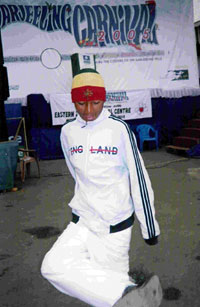 Unlike earlier Darjeeling Carnivals, this year's event seemed more geared to the local Darj crowd. It showcased local bands and musicians, with precious little for outside visitors.
Unlike earlier Darjeeling Carnivals, this year's event seemed more geared to the local Darj crowd. It showcased local bands and musicians, with precious little for outside visitors. Darjeeling's Mall, Chowrasta, was packed shoulder to shoulder and visitors couldn't move much. Sponsors Reliance India Mobile and other phone companies erected their oversized billboards which marred the view. It is bad enough that certain fast food outlets have created an architectural eyesore next to the Victorian-style Chalet Hotel in what was once termed the 'Queen of the Hills'.
It's a shame, really, that Chowrasta has been turned into mini Calcutta. With all the boisterous Bengali tourists and crowds of local youth milling around, Chowrasta during the 10-day Carnival was not a pleasant place.
Carnival organiser, Ajay Edwards, better known as the man behind Glenary's restaurants and bakeries, recently led a delegation of Darjeeling businessmen to meet India's Minister of Civil Aviation, Praful Patel who promised to allow international airlines to land in Bagdogra for tourists heading up to Darjeeling and Sikkim. Sounds like a golden opportunity for regional carriers such as Cosmic, if they pay their fuel bills.
There was one redeeming feature of Carnival 2005 and it had nothing to do with mobile phones and the blaring music. It was the simple, humble game of chungi-that quintessential Nepali low-tech 'time pass'.
No one knows the origin of chungi in Nepal. Some say it may have come from East Asia as it is related to the Thai and Burmese foot-kick, wicker-ball games. But when I first arrived in Kathmandu in the early 1980s-well before satellite tv and even televisions for most people-before FM radios, wide-screen movies and mobiles, before internet, before democracy there was chungi. Boys in the quiet, traffic-less streets idly kicking a small ball of rubber bands, sometimes it seemed for hours. There was nothing else to do.
So, on a Sunday afternoon after the 'Dogs Day Out' event in which the proud owners of dogs paraded their pets (the winner was a Saint Bernard owned by the proprietor of Mayfair Hotel) the chungi competition began.
For some reason it was all boys, all of them local youths who it seemed had a lot of practice. The MC counted their kicks and disqualified them if they dropped the rubberband ball. The average count was about 40 or 50 kicks. Only two got over 100 but one 15-year-old dressed in a knit yellow, black and red Rasta cap and a jacket emblazoned ironically with 'England' (during the British colonial era no natives were allowed to set foot on the Chowrasta) paced himself and rhythmically kept kicking that aerial black rubber projectile into the air. When he passed 200 the crowd gasped and it was 268 kicks before he finally lost it.
The winner, one Sagar Roka, happily accepted his prize, a Darjeeling Carnival t-shirt and disappeared into the crowd.
The next event was a momo-eating contest. The carnival was supposed to close with fireworks and more loud music. But that's not what I came to Darjeeling for. Call me quirky, even old-fashioned but I prefer the soft whooshing sound of the chungi and the whispering of the cryptomeria.
The Darjeeling I love is more about the tinkling temple bells of Mahakal Mandir atop the hill dubbed Dorje Ling-the place of the thunderbolt-with its rustling prayer flags. And somewhere below, the rustle of pines punctuated by the steam-whistle shriek of the toy train.


